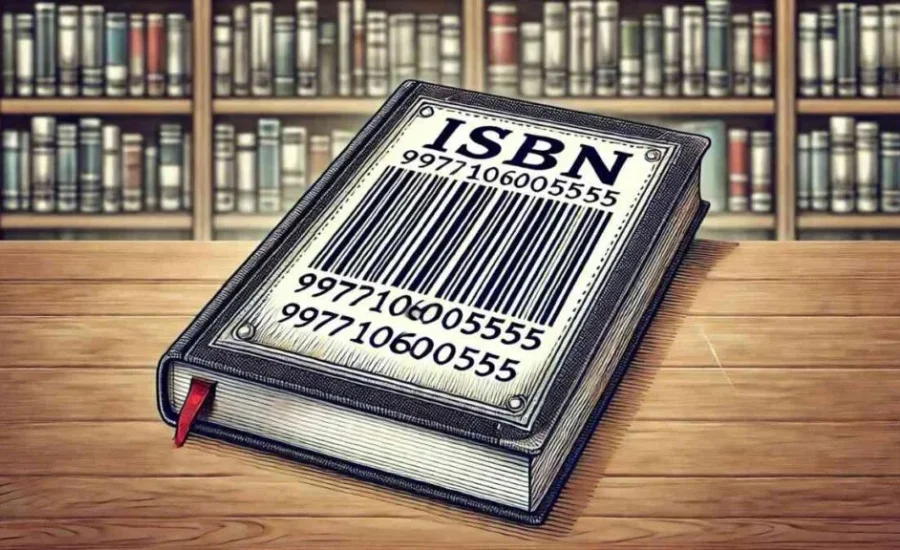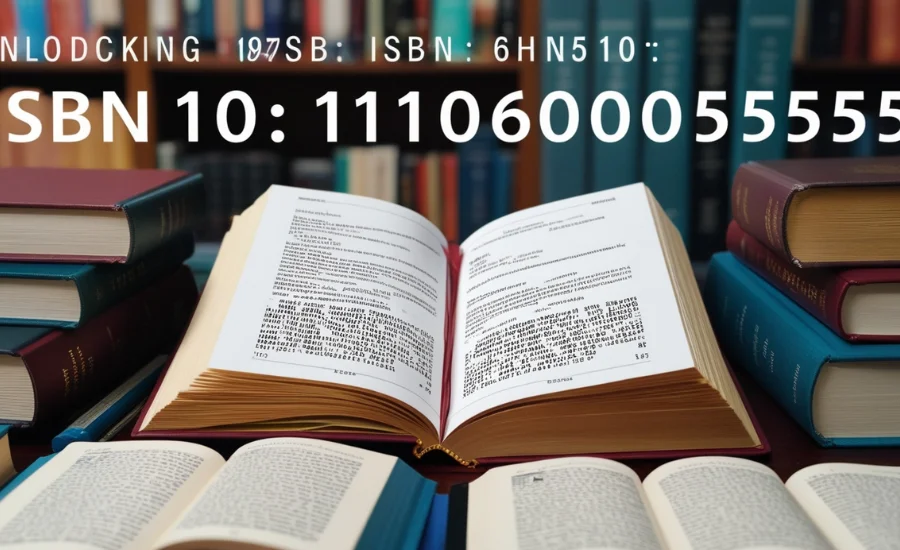9781016005555, Books are assigned a distinctive code known as the International Standard Book Number (ISBN), a system that ensures each published book has a unique identifier. This numbering system makes it easy to track, organize, and distribute books globally. In this piece, we’ll take a closer look at one particular ISBN, “9781016005555” (ISBN-10: 1016005555), examining its significance and the role ISBNs play in simplifying processes for authors, publishers, and booksellers.
What Is an ISBN and Why Does It Matter?
An ISBN is more than just a number on the back cover of a book; it’s a vital tool in the publishing industry. Each ISBN corresponds to a specific book edition, making it possible for bookstores, libraries, and online platforms to efficiently manage inventory and sales. The use of ISBNs helps avoid confusion between different editions or versions of a title, streamlining both cataloging and distribution.
The Role of ISBNs in Streamlining Book Identification
Each book published receives a distinct identifier called the International Standard Book Number (ISBN), a 10- or 13-digit code that plays a critical role in how books are tracked and managed across the publishing world. Retailers, libraries, and distributors depend on this code to differentiate between various titles, authors, and editions, ensuring accuracy when books are ordered, cataloged, or sold. For example, the number “9781016005555” (ISBN-10: 1016005555) is a unique identifier for a specific title, making it easy for both consumers and professionals to find exactly what they’re looking for.
Why ISBNs Are Essential for Books
The ISBN is indispensable in the publishing industry, serving as a safeguard against confusion when multiple editions or versions of a book exist. It guarantees that the correct version is referenced or purchased. Without an ISBN, books would be challenging to track or discover in bookstores, online platforms, and libraries, rendering them almost invisible to potential readers.
By providing a standardized way of identifying books, ISBNs make it easier to locate, distribute, and market books globally, ensuring they reach their intended audience efficiently. This system is a cornerstone of the book industry, enhancing discoverability and accuracy in an ever-growing market.
Decoding the Structure of an ISBN
An ISBN, whether in its 13-digit or 10-digit format, follows a standardized structure that allows for easy identification and categorization of books. In the ISBN “9781016005555” (ISBN-10: 1016005555), the initial three digits (978) serve as the prefix, indicating that the book is registered within the global ISBN system. The remaining numbers (1016005555) provide a unique identifier specific to that book, which includes details about the publisher, edition, and other important aspects.
Each number within an ISBN is carefully assigned to ensure that every book has its own exclusive code. This precision makes the ISBN system indispensable for global book distribution, helping publishers, retailers, and libraries manage vast inventories with ease and accuracy.
How ISBNs Benefit the Publishing Industry

For publishers, an ISBN ensures that their books are easy to locate and sell across different markets and platforms. Retailers and distributors rely heavily on this system for processing orders and managing stock. In addition, an ISBN makes it possible for books to be discovered by readers, enabling seamless transactions and distribution across various regions, both online and offline.
In short, the ISBN system provides a robust framework that supports the global reach and management of books, benefiting authors, publishers, and retailers alike. This standardized system ensures that every book, no matter where it’s sold, can be easily found and purchased, contributing to the growth and accessibility of literature worldwide.
Why ISBNs Are Crucial for Publishers
For publishers, the ISBN is a fundamental tool that ensures their books are easily searchable and accessible across global platforms. By assigning a unique ISBN to each title, publishers can register their books in international databases, making them discoverable to retailers, libraries, and consumers alike. Major retailers like Amazon and Barnes & Noble require books to have a verifiable ISBN in order to be sold on their platforms, highlighting the system’s importance for commercial success.
The ISBN “9781016005555” (ISBN-10: 1016005555) is just one example of how this numbering system simplifies the distribution process. Without an ISBN, it would be nearly impossible for books to reach their target audiences, making it an indispensable part of modern publishing.
How ISBNs Ensure Precise Book Identification
The ISBN “9781016005555” (ISBN-10: 1016005555) represents a specific book, serving as a digital fingerprint that ensures accurate identification across platforms. ISBNs provide a reliable way for readers, sellers, and distributors to locate a particular title or edition, avoiding any mix-up with similar books. Each ISBN links to detailed product information, such as the author, publisher, publication date, edition, and even binding type.
By searching for “9781016005555” or “1016005555,” consistent information about the book’s details will be readily available. This system is crucial for buying, selling, cataloging, or referencing a title in bookstores, libraries, or academic settings, ensuring a streamlined experience for everyone involved in the book trade.
The Critical Role of ISBNs in Publishing
ISBNs, like “9781016005555” (ISBN-10: 1016005555), are indispensable to the publishing world. Without this structured system, managing the sheer volume of books published annually would be an overwhelming task. Each new edition, reprint, or international release of a book is assigned its own unique ISBN to ensure precise identification, allowing booksellers and libraries to quickly locate the exact edition they need.
Beyond identification, ISBNs play a vital role in tracking sales, royalties, and distribution, ensuring authors, publishers, and other stakeholders receive accurate payments. As the backbone of the publishing industry, the ISBN system is essential for managing millions of books globally, making it a crucial tool for efficiency and organization.
How ISBNs Simplify the Buying and Selling Process

For consumers, ISBNs like “9781016005555” (ISBN-10: 1016005555) are essential for ensuring they purchase the exact book or edition they need. By entering the ISBN, buyers can avoid confusion caused by similar titles or multiple editions, making the buying process more straightforward and reliable.
For sellers, ISBNs are a key tool in managing inventory. Each edition of a book has its own ISBN, allowing bookstores and retailers to track sales, monitor stock levels, and reorder efficiently. Whether for a small bookstore or a major retailer, ISBNs help streamline operations, reducing the chance of stock discrepancies and improving overall inventory control.
The Value of ISBNs in Locating Specific Books
An ISBN, like “9781016005555” (ISBN-10: 1016005555), is an essential tool for anyone searching for a particular book or edition. Many online platforms, including publisher and library databases, allow users to find books by simply entering the ISBN. This ensures quick access to the full product details, such as the title, author, publication date, and even reviews.
When searching for “9781016005555” or “1016005555,” you’re tapping into a trusted system used by booksellers, retailers, and libraries around the world. Whether you’re looking to buy a copy or confirm its details, using the ISBN guarantees you find the correct book quickly and efficiently.
Understanding the Difference Between ISBN-10 and ISBN-13
While both ISBN-10 and ISBN-13 formats serve the same purpose of identifying books, they differ slightly in structure. The ISBN-10 format, as seen with codes like “9781016005555” (ISBN-10: 1016005555), is an older system that has been largely replaced by ISBN-13 to meet the growing demand for new publications.
Despite the shift to ISBN-13, which offers a more globally standardized system, ISBN-10 remains in use, especially for books published before 2007. Many databases and systems still recognize ISBN-10, ensuring that older books remain easily accessible within the industry.
The Multifaceted Role of ISBNs in Book Commerce

ISBNs, such as “9781016005555” (ISBN-10: 1016005555), play a crucial role in the global book market. They facilitate international sales, allowing books to seamlessly move across borders and into diverse markets. For retailers, including major players like Amazon and Barnes & Noble, ISBNs streamline inventory management, aid in ordering new stock, and simplify sales processing.
In library settings, ISBNs are essential for cataloging, making it easier for users to search for and locate specific titles within collections. When readers use an ISBN to find a book, they access a robust system that enhances the buying, selling, lending, and borrowing of books worldwide. This structure minimizes confusion and ensures that the correct edition and format of a book are readily available to everyone.
The Simple Process of Obtaining an ISBN

Acquiring an ISBN is a straightforward process for authors and publishers. They can purchase ISBNs from authorized agencies, such as Bowker in the United States or Nielsen in the United Kingdom. Once assigned, an ISBN becomes an integral part of a book’s identity, ensuring that each title has a unique number that cannot be duplicated.
For self-published authors, securing an ISBN—like “9781016005555” (ISBN-10: 1016005555)—is essential for accessing various sales channels. Without an ISBN, books typically cannot be sold on major online platforms or in bookstores. Therefore, understanding the importance of an ISBN is crucial for all authors, whether they are collaborating with traditional publishers or choosing to self-publish.
Also Read: Monogram With Baskerville Bol 3 Letters
Final Words
The ISBN system is a crucial element in the global book industry, helping to identify, track, and distribute books efficiently. ISBNs like “9781016005555” (ISBN-10: 1016005555) provide a unique identifier for each edition of a book, making it easy for publishers, retailers, and libraries to manage inventory and sales. This system eliminates confusion between different editions or titles and ensures that the correct version is easily found by readers. For publishers, obtaining an ISBN is essential, as major retailers require it for listing and selling books. Overall, ISBNs streamline the publishing process, facilitating the global reach and accessibility of books.
For deeper insights and fresh perspectives, visit us at Incredible Wave.

